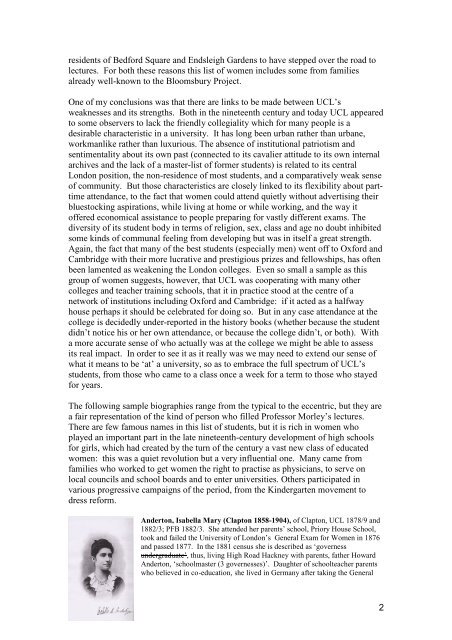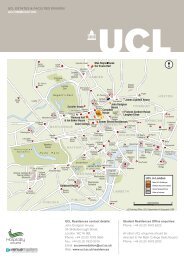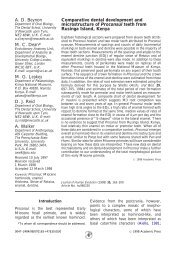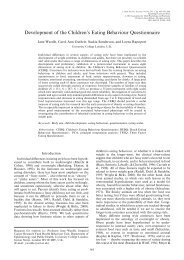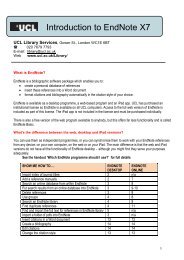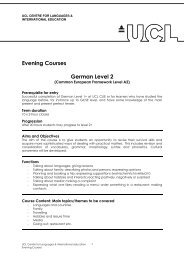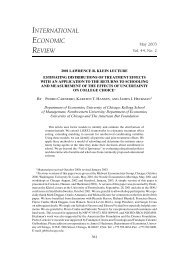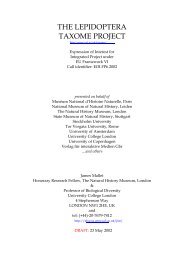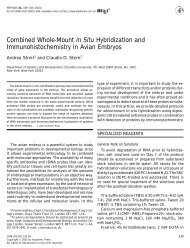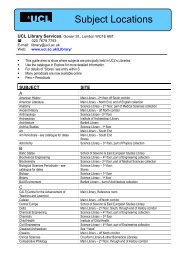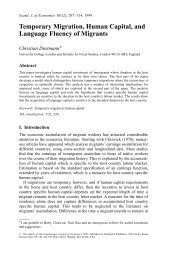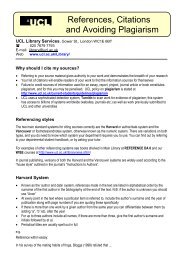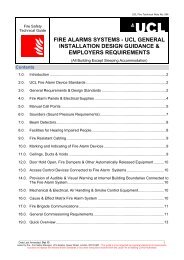Women students at UCL in the early - University College London
Women students at UCL in the early - University College London
Women students at UCL in the early - University College London
You also want an ePaper? Increase the reach of your titles
YUMPU automatically turns print PDFs into web optimized ePapers that Google loves.
esidents of Bedford Square and Endsleigh Gardens to have stepped over <strong>the</strong> road to<br />
lectures. For both <strong>the</strong>se reasons this list of women <strong>in</strong>cludes some from families<br />
already well-known to <strong>the</strong> Bloomsbury Project.<br />
One of my conclusions was th<strong>at</strong> <strong>the</strong>re are l<strong>in</strong>ks to be made between <strong>UCL</strong>’s<br />
weaknesses and its strengths. Both <strong>in</strong> <strong>the</strong> n<strong>in</strong>eteenth century and today <strong>UCL</strong> appeared<br />
to some observers to lack <strong>the</strong> friendly collegiality which for many people is a<br />
desirable characteristic <strong>in</strong> a university. It has long been urban r<strong>at</strong>her than urbane,<br />
workmanlike r<strong>at</strong>her than luxurious. The absence of <strong>in</strong>stitutional p<strong>at</strong>riotism and<br />
sentimentality about its own past (connected to its cavalier <strong>at</strong>titude to its own <strong>in</strong>ternal<br />
archives and <strong>the</strong> lack of a master-list of former <strong>students</strong>) is rel<strong>at</strong>ed to its central<br />
<strong>London</strong> position, <strong>the</strong> non-residence of most <strong>students</strong>, and a compar<strong>at</strong>ively weak sense<br />
of community. But those characteristics are closely l<strong>in</strong>ked to its flexibility about parttime<br />
<strong>at</strong>tendance, to <strong>the</strong> fact th<strong>at</strong> women could <strong>at</strong>tend quietly without advertis<strong>in</strong>g <strong>the</strong>ir<br />
bluestock<strong>in</strong>g aspir<strong>at</strong>ions, while liv<strong>in</strong>g <strong>at</strong> home or while work<strong>in</strong>g, and <strong>the</strong> way it<br />
offered economical assistance to people prepar<strong>in</strong>g for vastly different exams. The<br />
diversity of its student body <strong>in</strong> terms of religion, sex, class and age no doubt <strong>in</strong>hibited<br />
some k<strong>in</strong>ds of communal feel<strong>in</strong>g from develop<strong>in</strong>g but was <strong>in</strong> itself a gre<strong>at</strong> strength.<br />
Aga<strong>in</strong>, <strong>the</strong> fact th<strong>at</strong> many of <strong>the</strong> best <strong>students</strong> (especially men) went off to Oxford and<br />
Cambridge with <strong>the</strong>ir more lucr<strong>at</strong>ive and prestigious prizes and fellowships, has often<br />
been lamented as weaken<strong>in</strong>g <strong>the</strong> <strong>London</strong> colleges. Even so small a sample as this<br />
group of women suggests, however, th<strong>at</strong> <strong>UCL</strong> was cooper<strong>at</strong><strong>in</strong>g with many o<strong>the</strong>r<br />
colleges and teacher tra<strong>in</strong><strong>in</strong>g schools, th<strong>at</strong> it <strong>in</strong> practice stood <strong>at</strong> <strong>the</strong> centre of a<br />
network of <strong>in</strong>stitutions <strong>in</strong>clud<strong>in</strong>g Oxford and Cambridge: if it acted as a halfway<br />
house perhaps it should be celebr<strong>at</strong>ed for do<strong>in</strong>g so. But <strong>in</strong> any case <strong>at</strong>tendance <strong>at</strong> <strong>the</strong><br />
college is decidedly under-reported <strong>in</strong> <strong>the</strong> history books (whe<strong>the</strong>r because <strong>the</strong> student<br />
didn’t notice his or her own <strong>at</strong>tendance, or because <strong>the</strong> college didn’t, or both). With<br />
a more accur<strong>at</strong>e sense of who actually was <strong>at</strong> <strong>the</strong> college we might be able to assess<br />
its real impact. In order to see it as it really was we may need to extend our sense of<br />
wh<strong>at</strong> it means to be ‘<strong>at</strong>’ a university, so as to embrace <strong>the</strong> full spectrum of <strong>UCL</strong>’s<br />
<strong>students</strong>, from those who came to a class once a week for a term to those who stayed<br />
for years.<br />
The follow<strong>in</strong>g sample biographies range from <strong>the</strong> typical to <strong>the</strong> eccentric, but <strong>the</strong>y are<br />
a fair represent<strong>at</strong>ion of <strong>the</strong> k<strong>in</strong>d of person who filled Professor Morley’s lectures.<br />
There are few famous names <strong>in</strong> this list of <strong>students</strong>, but it is rich <strong>in</strong> women who<br />
played an important part <strong>in</strong> <strong>the</strong> l<strong>at</strong>e n<strong>in</strong>eteenth-century development of high schools<br />
for girls, which had cre<strong>at</strong>ed by <strong>the</strong> turn of <strong>the</strong> century a vast new class of educ<strong>at</strong>ed<br />
women: this was a quiet revolution but a very <strong>in</strong>fluential one. Many came from<br />
families who worked to get women <strong>the</strong> right to practise as physicians, to serve on<br />
local councils and school boards and to enter universities. O<strong>the</strong>rs particip<strong>at</strong>ed <strong>in</strong><br />
various progressive campaigns of <strong>the</strong> period, from <strong>the</strong> K<strong>in</strong>dergarten movement to<br />
dress reform.<br />
Anderton, Isabella Mary (Clapton 1858-1904), of Clapton, <strong>UCL</strong> 1878/9 and<br />
1882/3; PFB 1882/3. She <strong>at</strong>tended her parents’ school, Priory House School,<br />
took and failed <strong>the</strong> <strong>University</strong> of <strong>London</strong>’s General Exam for <strong>Women</strong> <strong>in</strong> 1876<br />
and passed 1877. In <strong>the</strong> 1881 census she is described as ‘governess<br />
undergradu<strong>at</strong>e’, thus, liv<strong>in</strong>g High Road Hackney with parents, f<strong>at</strong>her Howard<br />
Anderton, ‘schoolmaster (3 governesses)’. Daughter of schoolteacher parents<br />
who believed <strong>in</strong> co-educ<strong>at</strong>ion, she lived <strong>in</strong> Germany after tak<strong>in</strong>g <strong>the</strong> General<br />
2


